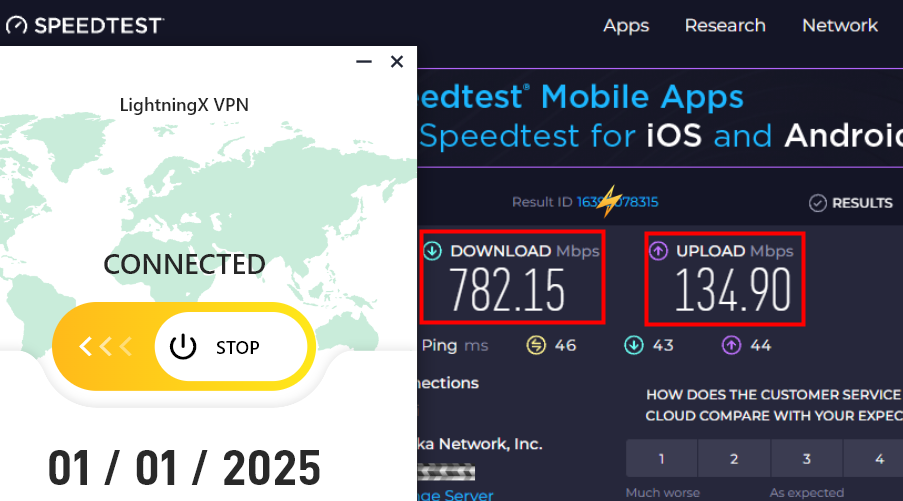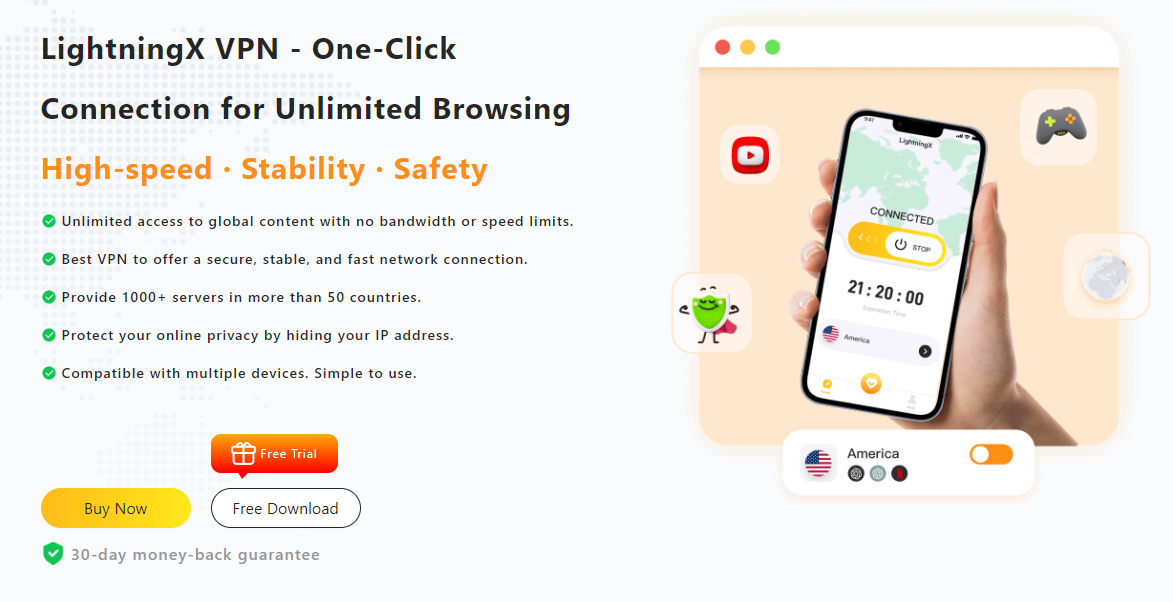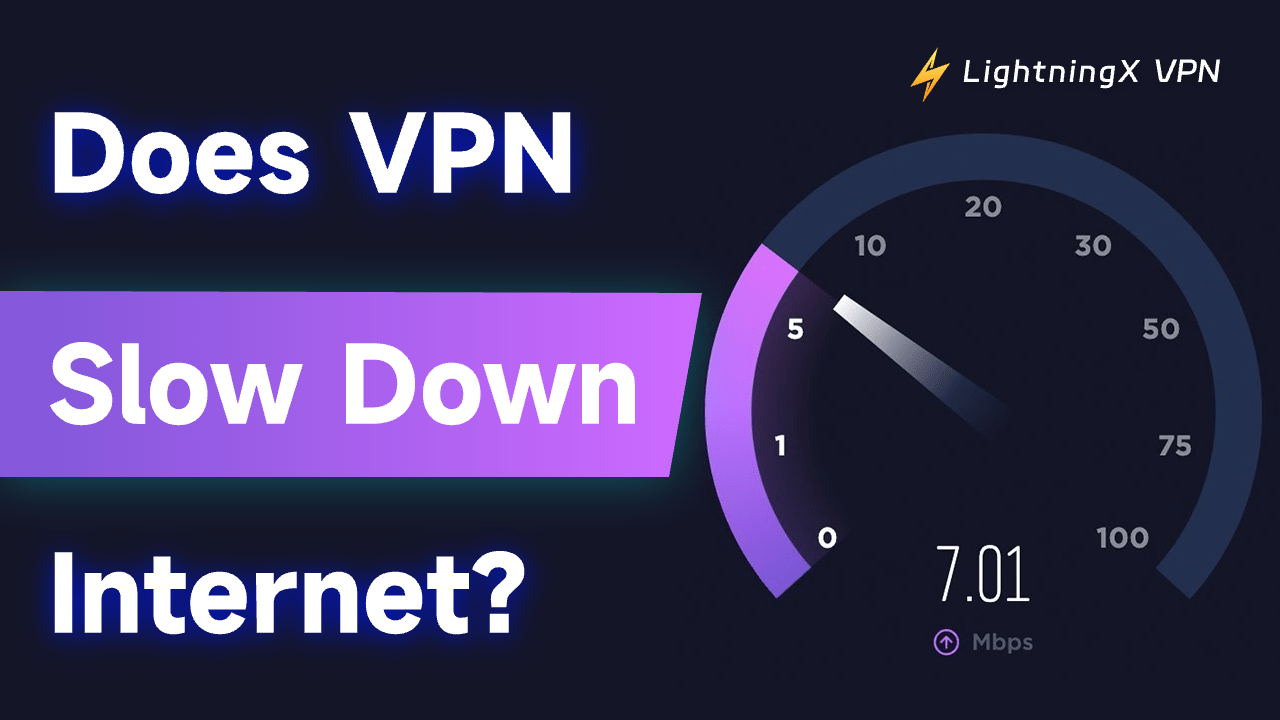Wondering does a VPN slows down the internet? Yes, it can slightly reduce speed. But with the right VPN, your connection stays fast, secure, and smooth.
Now, let’s learn how to minimize slowdown and even improve your internet speed when using a VPN.
Does a VPN Slow Down the Internet?
Worried that a VPN will slow down your internet? Most VPNs do reduce speed by 10–30%, but the impact depends on your provider, server, and protocol. A high-quality VPN keeps the slowdown almost unnoticeable, so streaming, gaming, and browsing stay smooth.
Example:
- Without VPN: 100 Mbps download
- With VPN: 80–90 Mbps download
This slight drop happens because your traffic is encrypted and rerouted, but with the right setup, you might barely notice it. In some cases, a VPN can even help bypass throttling and make your internet faster.
Why Does a VPN Slow Down Your Internet Speed?
A VPN can affect your internet speed due to encryption, server distance, and routing efficiency. Let’s look at the main reasons why a VPN can slow down your internet.
1. Encryption Consumes Bandwidth
When you use a VPN, your internet traffic is encrypted before leaving your device and decrypted once it reaches the VPN server. This process naturally consumes computing power and a bit of bandwidth.
Stronger encryption protocols provide greater security but require more resources. Modern protocols like WireGuard are designed to increase speed, which reduces overhead compared to older protocols like OpenVPN.
2. Distance Between You and the VPN Server
If you’re connected to a server that’s far away, your data has to travel a longer distance, which increases latency and slows down your internet.
For example, if you’re in the U.S. and connect to a server in Asia, you may notice slower speeds. To reduce lag, always connect to a VPN server near your location.
3. Server Load and Bandwidth Sharing
Each VPN server has limited resources. When it’s overcrowded, your speed drops because bandwidth is shared among users. Premium VPNs usually prevent this by using load balancing and maintaining thousands of high-speed servers.
If you notice slower performance, try switching to a less busy server.
4. Routing Efficiency
Not all VPNs route traffic the same way. Some providers invest in better infrastructure and optimize routing to reduce unnecessary detours.
High-quality VPNs invest in optimized routing and premium infrastructure to minimize latency. In some cases, a well-optimized VPN can even increase your internet speed, especially if your ISP throttles certain websites or services.
How Much Does a VPN Slow Down Your Internet Speed?
You might be wondering, “How much does a VPN slow down my internet speed?” Different VPN providers, server locations, and encryption protocols affect your connection differently. Some VPNs barely slow your speed, while others might cut it by 50% or more.
To show you exactly how a VPN affects internet speed, let’s look at a real-world test using LightningX VPN.

Step 1: Test Your Basic Internet Speed
Before connecting to a VPN, measure your internet speed using a tool like Speedtest.net or Fast.com. For example:
- Download speed: 100 Mbps
- Upload speed: 50 Mbps
- Ping: 15 ms
Step 2: Connect to a Nearby VPN Server
Now, let’s see does a VPN slows down your internet when connected to a local server. Connecting to a nearby VPN server minimizes latency and packet loss.
Speed test results after using LightningX VPN:
- Download speed: 92 Mbps
- Upload speed: 45 Mbps
- Ping: 18 ms
That’s only about a 5–10% drop, which means your VPN barely affects your internet speed. You can still stream, browse, and play online games smoothly. In some cases, a VPN may even make your internet feel faster by avoiding ISP throttling.
Step 3: Connect to a Remote VPN Server
Next, let’s check what happens when you connect to a server far from your physical location, for example, from the U.S. to Europe or Asia.
Test Results:
- Download Speed: 80 Mbps
- Upload Speed: 39 Mbps
- Ping: 38 ms
Here, the VPN slows down the internet by roughly 20%, mostly due to the longer data travel distance and encryption processing. Latency increases, which may impact gaming, though streaming and browsing remain smooth.
Step 4: Comparing Different VPN Providers
Not all VPNs perform the same. A key factor in how much a VPN affects your internet speed is the quality of its infrastructure.
| VPN Provider | Server Location | Download Speed | Upload Speed | Notes |
|---|---|---|---|---|
| LightningX VPN | Nearby | 92 Mbps | 48 Mbps | Minimal slowdown |
| LightningX VPN | Distant | 80 Mbps | 40 Mbps | Slight slowdown |
| Free VPN | Nearby | 50 Mbps | 25 Mbps | Congested, slower |
| Free VPN | Distant | 20 Mbps | 10 Mbps | Very slow, unstable |
Free VPNs often have limited servers and heavy user loads. That’s why free VPNs usually slow down your internet much more than paid VPNs.
Step 5: Tips for Minimizing VPN Speeds
- Always choose the closest server to ensure speed.
- Use a fast protocol like WireGuard.
- Avoid using free VPNs with overcrowded servers.
- Restart your router or device to clear temporary network issues.
By testing regularly, you’ll know exactly how much a VPN slows down internet speed and how to fine-tune your setup for faster performance.
If you intend to learn more about how to test a VPN, read this: VPN Test: How to Check If VPN Is Working?
How to Fix a Slow VPN Connection?
Slow VPN speeds can be frustrating, especially when you’re trying to stream, game, or work without interruptions. However, in most cases, this problem is easily fixed. Here’s a guide to increasing VPN speeds.
1. Connect to a closer server

The closer the VPN server is to your physical location, the shorter the distance your data has to travel. Most VPN apps, such as LightningX VPN, offer an “Automatically connect to the fastest server” option.
2. Switch to a faster VPN protocol
VPNs use many protocols to encrypt data. Some are more secure but slower, while others are faster and more secure.
- WireGuard: Fast, secure, and modern.
- OpenVPN: Reliable but slightly slower.
- IKEv2/IPSec: An ideal balance for mobile devices.
Switching protocols in your VPN app can significantly increase speeds without sacrificing privacy.
Read more: How to Increase Upload Speed: 12 Quick Tips!
3. Avoid free VPN servers
Free VPNs often have a limited number of servers, which are shared by too many users. This can lead to network congestion and slow speeds. Choose the best VPN with a large server base and intelligent load balancing.
For example, LightningX VPN has over 2,000 servers worldwide, ensuring you’re always connected to a fast, uncrowded server.
Read more: Are Free VPN Safe? 5 Risks You Need to Know!
4. Clear your browser cache and disable unnecessary extensions
Sometimes the problem isn’t the VPN, but your browser. Old cache files, cookies, and excessive extensions can slow down your browsing speed.
Clearing your browser cache, disabling unused extensions, and closing unnecessary tabs can improve device performance.
5. Restart your device and router
Network glitches or temporary device issues can cause VPN speeds to slow down.
You can try restarting your computer, phone, or router to refresh the connection.
6. Use a wired connection whenever possible
Wi-Fi is convenient, but it’s susceptible to interference from walls, other devices, or neighboring networks. Connecting via an Ethernet cable generally provides a more stable and faster connection.
7. Test different VPN servers
If your VPN is still slow after trying the above methods, try switching to a different server in the same region.
LightningX VPN provides a real-time speed test for each node, so you can intuitively see which node has the better speed.
Which VPN Doesn’t Slow Down Your Internet Connection?

If you’re looking for a VPN that doesn’t slow down your internet, LightningX VPN minimizes speed loss by combining optimized routing, high-speed infrastructure, and next-generation encryption.
Unlike many low-quality VPNs, it maintains consistent performance even during peak hours. Here’s what makes LightningX VPN stand out:
- Over 2000 high-speed servers worldwide
- Advanced encryption protocols like WireGuard
- No bandwidth or speed limits
- Automatically connect to the fastest server and optimize routing
- Smart load balancing to avoid server congestion.
It meets all of these criteria, making it one of the fastest VPNs without significantly slowing down your internet speed.
FAQ about VPN Slow Down Internet Speed
1. What is a good VPN speed?
For HD streaming: at least 25 Mbps. For gaming: 50 Mbps+. A quality VPN should deliver 70–90% of your base speed.
2. Will a free VPN slow down your connection?
Yes, free VPNs will slow down your connection. Free VPNs often have limited server options and are very crowded, which results in slower speeds.
3. Does a VPN make your internet faster?
No, a VPN will not make your internet faster. In fact, it may slow down your internet slightly as your data is encrypted and rerouted through the VPN server.















